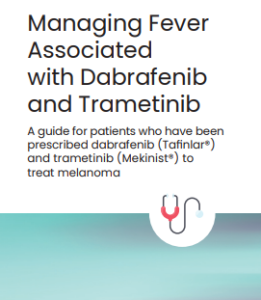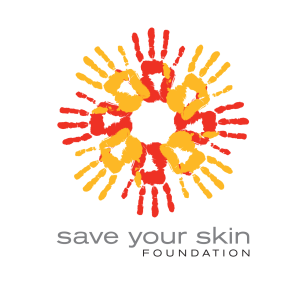What is Targeted Therapy?
There are several treatments for melanoma skin cancer, including targeted therapy and immunotherapy.
Targeted therapy drugs are designed to specifically target cancer cells. For melanoma, these drugs target the activity of a specific or unique feature of melanoma cancer cells. Genes are the instructions in cells for making new cells and controlling how cells behave. An abnormal change in these instructions – called a gene mutation – can cause cells to grow and divide out of control. Targeted therapy drugs are used as systemic therapy. For those patients with a BRAF mutation, there may be the option to use a combination of two oral (by mouth) drugs. When given together, these drugs can help block these proteins and stop the melanoma from growing. These drugs work only for people who have the BRAF mutation.
To determine if targeted therapy is an option for a patient, their tumor must be tested for a marker called BRAF. If the BRAF test shows that the tumor has the BRAF mutation, they are eligible for targeted therapy. But if the tumor does not have the BRAF mutation, they are not eligible for targeted therapy. About half of all melanoma patients have a mutated form of code for the BRAF protein in their tumors. This is called having a BRAF mutation.
Melanoma Treatment FAQs – Do’s, Don’ts, and Managing Side Effects
Recorded August 5, 2020
Hear the latest updates on current immunotherapy and targeted therapy treatments for melanoma and non-melanoma skin cancers in Canada. Dr. Smylie and Dr. Iafolla hold a panel discussion on recommended dietary and lifestyle habits while on treatment, as well as managing toxicities from fever and pneumonitis to dermatologic complications from IO and Targeted Therapies.
Post-ESMO Webinar with Dr. Reinhard Dummer
Recorded October 16, 2020
Presented by Professor Reinhard Dummer, Vice-Chairman of the Department of Dermatology in the University Hospital of Zürich, this webinar reviews late breaking news, key takeaways, clinical data and other updates presented at the European Society for Medical Oncology (ESMO) Virtual Congress Annual Meeting September-October 2020.
For more information, click here:
BRAF in Melanoma: Answering Questions, Addressing Misconceptions
In collaboration with AIM at Melanoma we develop patient and health care provider resources relevant to the Canadian population: www.aimwithimmunotherapy.org/canada
PeerVoice
Additional information and resources can be viewed or downloaded at PeerVoice. PeerVoice activities are designed to fill the unmet needs of the medical community by reporting information pertaining to clinically relevant advances and developments in the science and practice of medicine. These verbal interview-style presentations are also available as downloadable transcripts:

Managing Fever Associated with Dabrafenib and Trametinib
The Canadian Working Group published the following pyrexia management guidelines September 2021 in Current Oncology (open access: https://www.mdpi.com/1718-7729/28/5/304)
In addition to the guidelines and based on the needs identified by patients and their caregivers, they were able to develop two additional pieces to support patients prescribed with dabrafenib-trametinib.
Save Your Skin Foundation is pleased to endorse these two pieces and share this helpful information with patients and caregivers. Please click the links below to view:
A brochure/guide for patients who have been prescribed dabrafenib-trametinib (in both English and French)
A patient-facing video of what to expect when prescribed dabrafenib-trametinib (in both English and French)
Decision-Support Tool for Stage III Melanoma
Newly customized for the Canadian audience, this pamphlet is a document to provide/discuss with patients that helps guide their decision making regarding next steps for stage III melanoma. Reviewed by Save Your Skin Foundation, updated February 2021:
Want to learn how to use the Stage III Decision-Support Tool? Peruse frequently asked questions about Stage III melanoma and learn how to use the support tool to guide your decision making. Also developed in collaboration with Save Your Skin Foundation, updated February 2021:
NEW! Decision-Support Tool for Stage IV Melanoma
Newly customized for the Canadian audience, this pamphlet, created by AIM at Melanoma and reviewed by Save Your Skin Foundation in March 2023, is a document to support patients and help guide their decision making regarding next steps for stage IV melanoma:
The document addresses:
– Stage IV melanoma clinical picture, biomarkers and pathology, and disease and patient factors involved in decision making
– Efficacy, safety, administration, and family-planning aspects of targeted therapies, immune checkpoint inhibitors, and other therapies used for stage IV melanoma
Save Your Skin Foundation proudly partnered with the Melanoma Network of Canada to create a patient guide on navigating adjuvant therapies for melanoma. Click here to view and download the guide.
May 2021
An up-to-date list of available treatments can be found on the Canadian Agency for Drugs and Technologies in Health (CADTH) website’s Provincial drug formulary database, which can be accessed here. For more information about immunotherapy and BRAF inhibitor therapies and whether they might be an option for you, ask your Doctor.
Listed above are a few sources of information and support you might find useful. These groups are not connected to Save Your Skin Foundation. We are providing the links as useful sources of information but do not monitor content for accuracy and quality.
NOTE: The information on the Save Your Skin website is not intended to replace the medical advice of a doctor or healthcare provider. While we make every effort to ensure that the information on our site is as current as possible, please note that information and statistics are subject to change as new research and studies are published.
Making awareness and education available is crucial. Since 2006, the Foundation has worked to raise awareness of melanoma and non-melanoma skin cancers focusing on education, prevention and the need for improved patient care.


